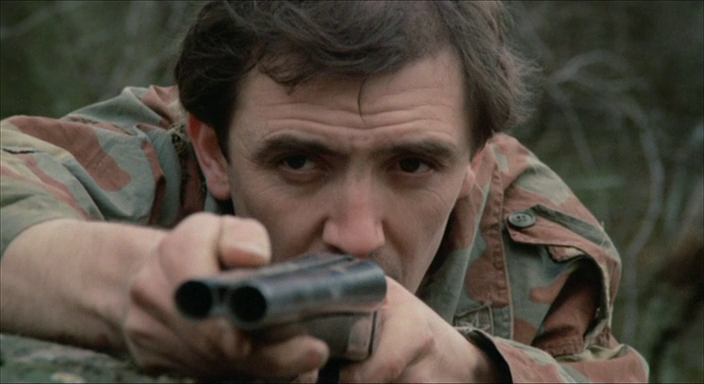
The Black Panther (1977)
“If you’re a good girl, I’ll come back.”
Former soldier, ballroom dancer and casual racist Donald Neilson (Donald Sumpter) likes to combine his part-time brick delivery business with a cross country run. He’s also taking the old scout adage of “be prepared” to extreme lengths, ensuring that at all times he has access to shaving equipment by secreting blades about his person.
Yes, Neilson is a very troubled man indeed.
He’s also an idiot, a fantasist, a bully, and remarkably unlucky. And by the end of this film, he’ll be a serial killer, kidnapper and armed robber.
Sadly, unlike the vast majority of such characters featured in the films on this website, he was also a real person.
Neilson reckons he’s come up with a fool-proof approach to successful post office armed robbery (bag on head, weird fake accent, shotgun), but being the very fool he’s attempting to proof his shenanigans from, his first attempt doesn’t go well. Unphased by this, he tries again, and things go even worse, with a postmaster shot and killed (all unflinchingly shown on-screen).
Surprisingly, Neilson is not the loner you might expect, but has a wife and daughter. Less surprisingly, he doesn’t treat them very well. This being the early 1970s (you can tell by the sweets for sale that frame his crimes, and the nostalgic soundtrack of cars failing to start), his family don’t seem to have any option but to put up with his militaristic routine (“Insubordination! You know what you’ll get!”), although the wife tries to cheer things up with a bit of jovial fat shaming of the daughter.
Armed robbery and murder clearly not enough, Neilson is also planning the kidnap of the daughter of a local businessman. No early 70s three-day week for this psychopath, he’s a veritable one-man cottage industry.
As the botched robberies and resultant spectacularly gory shootings continue, it’s apparent that one of the driving forces behind this behaviour is a lack of cash, the monosyllabic Neilson barking to his wife: “We’ll have money! I’ll get money!”
So preparations start for the big kidnap. A car is stolen, more innocent postpeople are killed, his clumsiness is shown with an (almost) comical self-spraying of ammonia, the front of his house is painted, and scrapbooks are updated (because in the tradition of all true nutcases, he’s documenting his crimes).
Just in case you might be thinking the film perhaps hadn’t ticked all the boxes in your “inappropriate handling of a sensitive subject” bingo card, the kidnap itself actually ups the ante on what has so far already been a spectacularly crass handling of this true crime story. His terrified (teenage) victim is dragged naked from her bed and ends up secured in an underground sewer. And things can only get darker.
As you’re probably gathering here, there’s not a huge amount of fun to be had with The Black Panther. If it wasn’t all so tragically true, the scenes of Neilson’s bungling attempts to get hold of the ransom money could perhaps raise a smile (is there anything quite a 1970s as his repeated foiling by two girls mucking about in the phone box he needs to use?). But unlike other crime thrillers, this one has clearly been devised and shot as a horror film, from the brutal, blood-spattered death scenes to his young victim’s final moments – wide-eyed as the pair of them realise the latest mistake he’s made and the true horror of what this means.
Tasteless? Yep. Inappropriate? Considering it was filmed just a couple of years after the events it portrays in such a gung-ho fashion, certainly. A worthy entry into the British horror film pantheon? Well, as a terrifying peek into a depressing episode of a dreary decade, that’s a yes, too.
